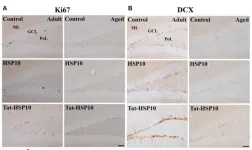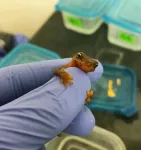(Press-News.org) Old, obese flies get healthier and live longer if put on a diet, University of Connecticut researchers report on Dec. 8 in PNAS. If the effect holds true for humans, it would mean it’s never too late for obese people to improve their health with diet.
For way too many of us, eating too much goes along with getting old and a tendency to be obese. Different health organizations define obesity differently, but all agree it means having too much body fat, and is associated with a host of diseases related to metabolism including heart disease and diabetes. Many animal studies have shown that eating less—meaning sharply restricting calories without malnutrition—lengthens lifespan. While human trials have shown evidence of beneficial effects of eating less on health, especially in healthy obese individuals, studies examining effects on lifespan have been unrealistic for humans.
Now, UConn School of Medicine researchers have shown that fruit flies fed a high sugar, high protein, high calorie diet that mimics the processed modern diet have metabolic changes similar to obese humans. Switching these obese flies to a low calorie diet, even very late in life, can dramatically change their metabolisms and extend their lives.
Fruit flies live short and fast—the lifespan of flies raised on a high calorie diet is less than 80 days, while the longest lived on a low calorie diet can reach 120 days. To test whether changes in diet late in life can change a fly’s lifespan, researchers led by geneticist Blanka Rogina from UConn’s Department of Genetics and Genome Sciences and the Institute for Systems Genomics raised several batches of fruit flies. Some of the flies were raised on a low calorie diet that provided just half the energy of a regular diet, while the others were raised on a high calorie diet that provided three times the usual number of calories.
In this study, they looked specifically at male flies. Young flies switched from a high calorie to a low-calorie diet at 20 days old lived very long lives, similar to the flies fed a low-calorie diet from day one.
What surprised the researchers was that switching the flies’ diet to a low calorie one remained a reliable way to extend lifespan even for old flies in ill health. The older insects raised on the high calorie diet had more lipids in their bodies, and they expended more energy defending their bodies from reactive oxygen species. They also had a higher death rate than flies raised on the low-calorie diet. But when the surviving high calorie flies were switched to a low-calorie diet at 50 or even 60 days (when most of the high calorie flies had already died) their metabolisms changed, their death rate plummeted, and their lifespans lengthened.
“Our studies were performed in flies aged on a high calorie diet, akin to obese individuals, suggesting that late-life diet shift in obese humans might have remarkable beneficial impact on health,” Rogina says.
UConn School of Medicine Genetics and Genome Sciences Chair Brent Graveley and other researchers on the team looked at the genes expressed by the high calorie flies and contrasted them with the low calorie flies. Genes that control physiological and metabolic adaptation are different between the groups.
“The remarkable finding of this study is that even after living a significant portion of their lives on a high calorie diet, flies can gain the benefits of life span extension by simply switching to a low calorie diet,” Graveley says.
The team’s results show that flies’ metabolisms can adapt to a change in diet even in old age. Since many basic metabolic pathways in fruit flies are shared with humans, this study suggests that human metabolism may respond the same way, and individuals eating a high calorie diet could benefit from reducing their calorie intake in old age. The researchers are currently analyzing data from female fruit flies to see if there are any sex-related differences in response to diet shifting.
END
Fat flies live longer on a diet at any age
Putting even elderly, obese flies on a restricted calorie diet extends their lifespan markedly, suggesting obese humans might get similar benefits from cutting calories, even at advanced age.
2023-12-12
ELSE PRESS RELEASES FROM THIS DATE:
European Policy Lab gathers stakeholders to map forest policy opportunities and barriers
2023-12-12
ForestPaths’ first Policy Lab convened stakeholders in Helsinki, Finland, on 27-29 September 2023. Nineteen carefully selected participants with diverse expertise – including research, policy, governance, civil society, value chain professionals, and forestry practitioners – engaged in discussions on forest-based policymaking and modelling related to climate change and biodiversity.
Tasked with considering policy actions given different timescales, governance paradigms, enablers, and barriers, participants contributed ...
Tat-heat shock protein 10 ameliorates age-related phenotypes in the hippocampus
2023-12-12
“Mitochondrial dysfunction is a major cellular change observed in the hippocampus during aging.”
BUFFALO, NY- December 12, 2023 – A new research paper was published in Aging (listed by MEDLINE/PubMed as "Aging (Albany NY)" and "Aging-US" by Web of Science) Volume 15, Issue 22, entitled, “Tat-heat shock protein 10 ameliorates age-related phenotypes by facilitating neuronal plasticity and reducing age-related genes in the hippocampus.”
In this new study, researchers Hyo Young Jung, Hyun Jung Kwon, Kyu ...
MIT researchers observe a hallmark quantum behavior in bouncing droplets
2023-12-12
In our everyday classical world, what you see is what you get. A ball is just a ball, and when lobbed through the air, its trajectory is straightforward and clear. But if that ball were shrunk to the size of an atom or smaller, its behavior would shift into a quantum, fuzzy reality. The ball would exist as not just a physical particle but also a wave of possible particle states. And this wave-particle duality can give rise to some weird and sneaky phenomena.
One of the stranger prospects comes from a thought experiment known as the “quantum bomb tester.” The experiment proposes that a quantum particle, such ...
Smoking causes brain shrinkage
2023-12-12
Smoking shrinks the brain, according to a study by researchers at Washington University School of Medicine in St. Louis. The good news is that quitting smoking prevents further loss of brain tissue — but still, stopping smoking doesn’t restore the brain to its original size. Since people’s brains naturally lose volume with age, smoking effectively causes the brain to age prematurely, the researchers said.
The findings, published in Biological Psychiatry: Global Open Science, help explain why smokers are at high risk of age-related cognitive decline and Alzheimer’s disease.
“Up until recently, scientists have overlooked ...
Mammogram rates increase when patients schedule themselves
2023-12-12
PHILADELPHIA— Having the ability to self-schedule mammograms was associated with a 15 percentage point increase following through with getting the screening, according to research from the Perelman School of Medicine at the University of Pennsylvania. The paper was published today in the American Journal of Preventive Medicine.
“Self-scheduling helps make the path to mammogram completion a little smoother, where you don’t have to find the time to call a scheduling line, wait on hold, or go back and forth trying to find an appointment that works for your schedule,” said the study’s lead author, Kimberly Waddell, ...
Protein study could one day advance Parkinson’s, breast cancer care
2023-12-12
PORTLAND, Oregon -- New research from Oregon Health & Science University could one day lead to therapies that prevent or treat diseases and infections tied to a protein that’s found in all human cells.
A study published today in the journal Molecular Cell describes how the protein ubiquitin is modified during a bacterial infection. The study details the steps taken to create a form of the protein known as lysine 6 polyubiquitin, where a long chain of ubiquitin molecules are linked through ...
Study exposes opportunities for strengthening cancer drugs trials in China
2023-12-12
More than one-eighth of the randomized trials of cancer drugs seeking regulatory approval in China in recent years used inappropriate controls to test the effectiveness and safety of the drugs, according to a new study published December 12th in the open access journal PLOS Medicine by Professor Xiaodong Guan of Peking University, China, and colleagues.
In randomized trials, patients are assigned to either a control arm, in which they receive the current optimal treatment, or an experimental arm, in which they receive the new drug being tested. However, studies have previously ...
Zapping manure with special electrode promises an efficient method to produce fertilizers, other chemicals
2023-12-12
MADISON – An interdisciplinary team led by University of Wisconsin–Madison scientists has developed a new technique that could help farmers extract useful nutrients such as ammonia and potassium from livestock manure to efficiently make fertilizer and other useful chemical products. While the strategy still needs to be scaled up beyond a proof-of-concept stage, the group's preliminary analyses show it could offer considerable benefits by cutting water and air pollution while simultaneously creating products that farmers could use or sell.
Manure stinks in part because it contains ammonia, one of the more ...
Novel early-detection method aims to stem disease spread in animal trade
2023-12-12
DENVER/Dec. 12, 2023 – A new article published in the journal Methods in Ecology and Evolution by Morris Animal Foundation-funded researchers describes a simplified method to detect a deadly fungus killing European salamanders. The ability to rapidly find the fungus is significant as the disease, although not detected in the U.S., could impact the millions of amphibians and salamanders annually imported.
The fungal pathogen Batrachochytrium salamandrivorans, or Bsal, threatens salamander diversity. Initially identified in northern Europe, evidence suggests it was introduced from Southeast Asia via the pet trade.
“The impacts of Bsal ...
EMBO launches new award for sustainability in the lab
2023-12-12
EMBO launches a new award for laboratory sustainability: The EMBO Lab Sustainability Award will recognize new and significant contributions to the development of sustainable wet and dry labs with a focus on their environmental impact. The award will be presented to an individual representing the initiative or project. Applications can be submitted between 15 January and 15 March 2024.
The award winner will have the opportunity to present their initiative or project at scientific events and publish a commentary in EMBO Reports. In addition, the winning project will be supported with a grant of 10,000 euros. The award is one of ...
LAST 30 PRESS RELEASES:
The Lancet: First-ever in-utero stem cell therapy for fetal spina bifida repair is safe, study finds
Nanoplastics can interact with Salmonella to affect food safety, study shows
Eric Moore, M.D., elected to Mayo Clinic Board of Trustees
NYU named “research powerhouse” in new analysis
New polymer materials may offer breakthrough solution for hard-to-remove PFAS in water
Biochar can either curb or boost greenhouse gas emissions depending on soil conditions, new study finds
Nanobiochar emerges as a next generation solution for cleaner water, healthier soils, and resilient ecosystems
Study finds more parents saying ‘No’ to vitamin K, putting babies’ brains at risk
Scientists develop new gut health measure that tracks disease
Rice gene discovery could cut fertiliser use while protecting yields
Jumping ‘DNA parasites’ linked to early stages of tumour formation
Ultra-sensitive CAR T cells provide potential strategy to treat solid tumors
Early Neanderthal-Human interbreeding was strongly sex biased
North American bird declines are widespread and accelerating in agricultural hotspots
Researchers recommend strategies for improved genetic privacy legislation
How birds achieve sweet success
More sensitive cell therapy may be a HIT against solid cancers
Scientists map how aging reshapes cells across the entire mammalian body
Hotspots of accelerated bird decline linked to agricultural activity
How ancient attraction shaped the human genome
NJIT faculty named Senior Members of the National Academy of Inventors
App aids substance use recovery in vulnerable populations
College students nationwide received lifesaving education on sudden cardiac death
Oak Ridge National Laboratory launches the Next-Generation Data Centers Institute
Improved short-term sea level change predictions with better AI training
UAlbany researchers develop new laser technique to test mRNA-based therapeutics
New water-treatment system removes nitrogen, phosphorus from farm tile drainage
Major Canadian study finds strong link between cannabis, anxiety and depression
New discovery of younger Ediacaran biota
Lymphovenous bypass: Potential surgical treatment for Alzheimer's disease?
[Press-News.org] Fat flies live longer on a diet at any agePutting even elderly, obese flies on a restricted calorie diet extends their lifespan markedly, suggesting obese humans might get similar benefits from cutting calories, even at advanced age.




